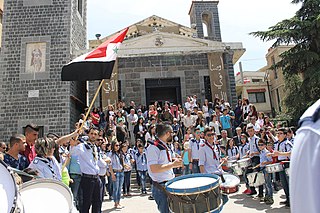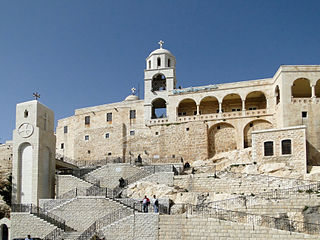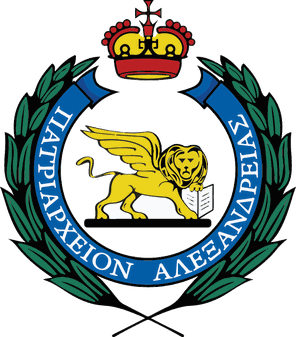
Eastern Christianity comprises Christian traditions and church families that originally developed during classical and late antiquity in the Eastern Mediterranean region or locations further east, south or north. The term does not describe a single communion or religious denomination. Eastern Christianity is a category distinguished from Western Christianity, which is composed of those Christian traditions and churches that originally developed further west.

Patriarchate is an ecclesiological term in Christianity, designating the office and jurisdiction of an ecclesiastical patriarch. According to Christian tradition three patriarchates were established by the apostles as apostolic sees in the 1st century: Rome, Antioch, and Alexandria. Constantinople was added in the 4th century and Jerusalem in the 5th century. Eventually, together, these five were recognised as the pentarchy by the Council of Chalcedon in 451.

The Syriac Orthodox Church ; also known as West Syriac Church or West Syrian Church, officially known as the Syriac Orthodox Patriarchate of Antioch and All the East, and informally as the Jacobite Church, is an Oriental Orthodox church that branched from the Church of Antioch. The bishop of Antioch, known as the patriarch, heads the church and possesses apostolic succession through Saint Peter, according to sacred tradition. The church upholds Miaphysite doctrine in Christology, and employs the Liturgy of Saint James, associated with James the Just. Classical Syriac is the official and liturgical language of the church.
Greek Orthodox Church is a term that can refer to any one of three classes of Christian churches, each associated in some way with Greek Christianity, Levantine Arabic-speaking Christians or more broadly the rite used in the Eastern Roman Empire.
The Patriarch of Antioch is a traditional title held by the bishop of Antioch. As the traditional "overseer" of the first gentile Christian community, the position has been of prime importance in Pauline Christianity from its earliest period. This diocese is one of the few for which the names of its bishops from the apostolic beginnings have been preserved. Today five churches use the title of patriarch of Antioch: one Oriental Orthodox ; three Eastern Catholic ; and one Eastern Orthodox.

The Greek Orthodox Patriarchate of Antioch, also known as the Antiochian Orthodox Church and legally as the RūmOrthodox Patriarchate of Antioch and All the East, is an autocephalous Greek Orthodox church within the wider communion of Eastern Orthodox Christianity that originates from the historical Church of Antioch. Headed by the Greek Orthodox patriarch of Antioch, it considers itself the successor to the Christian community founded in Antioch by the Apostles Peter and Paul. It is one of the largest Christian denominations of the Middle East, alongside the Copts of Egypt and the Maronites of Lebanon.

Arab Christians are ethnic Arabs, Arab nationals, or Arabic speakers, who follow Christianity. The number of Arab Christians who live in the Middle East was estimated in 2012 to be between 10 and 15 million. Arab Christian communities can be found throughout the Arab world, but are concentrated in the Eastern Mediterranean region of the Levant and Egypt, with smaller communities present throughout the Arabian Peninsula and North Africa.

The Greek Orthodox Patriarchate of Jerusalem, also known as the Greek Orthodox Church of Jerusalem, is an autocephalous church within the wider communion of Eastern Orthodox Christianity. Established in the mid-fifth century as one of the oldest patriarchates in Christendom, it is headquartered in the Church of the Holy Sepulchre in Jerusalem and led by the patriarch of Jerusalem, currently Theophilos III. The patriarchate's ecclesiastical jurisdiction includes roughly 200,000 to 500,000 Orthodox Christians across the Holy Land in Palestine, Jordan and Israel.

The Melkite Greek Catholic Church, or Melkite Byzantine Catholic Church, is an Eastern Catholic church in full communion with the Holy See as part of the worldwide Catholic Church. Its chief pastor is Patriarch Youssef Absi, headquartered at the Cathedral of Our Lady of the Dormition in Damascus, Syria. The Melkites, who are Byzantine Rite Catholics, trace their history to the early Christians of Antioch, formerly part of Syria and now in Turkey, of the 1st century AD, where Christianity was introduced by Saint Peter.

The term Melkite, also written Melchite, refers to various Eastern Christian churches of the Byzantine Rite and their members originating in West Asia. The term comes from the common Central Semitic root m-l-k, meaning "royal", referring to the loyalty to the Byzantine emperor. The term acquired religious connotations as denominational designation for those Christians who accepted imperial religious policies, based on Christological resolutions of the Council of Chalcedon (451).

Alphabetical list of Eastern Christianity-related articles on English Wikipedia

Christianity in Lebanon has a long and continuous history. Biblical scriptures show that Peter and Paul evangelized the Phoenicians, leading to the dawn of the ancient Patriarchate of Antioch. As such, Christianity in Lebanon is as old as Christian faith itself. Christianity spread slowly in Lebanon due to pagans who resisted conversion, but it ultimately spread throughout the country. Even after centuries of living under Muslim Empires, Christianity remains the dominant faith of the Mount Lebanon region and has substantial communities elsewhere.

Antiochian Greek Christians are an ethnoreligious Eastern Christian group native to the Levant. They are either members of the Greek Orthodox Church of Antioch or the Melkite Greek Catholic Church, and they have ancient roots in what is now Syria, Lebanon, Palestine, Jordan, the southern Turkish province of Hatay, which includes the city of Antakya —one of the holiest cities in Eastern Christianity, and Israel. Many of their descendants now live in the global Near Eastern Christian diaspora. They primarily speak Levantine Arabic, with Maaloula near Damascus being one of the few places where a Western Aramaic dialect is still spoken.

Christians in Syria made up about 10% of the pre-war Syrian population. The country's largest Christian denomination is the Greek Orthodox Church of Antioch, closely followed by the Maronite Church and the Assyrian Church of the East; the cities of Damascus and Aleppo are believed to have the largest number of Christians in Syria. There is a small minority of Protestants in the country.

The Greek OrthodoxPatriarchate of Alexandria and all Africa, also known as the Greek Orthodox Church of Alexandria, is an autocephalous patriarchate that is part of the Eastern Orthodox Church. Its seat is in Alexandria and it has canonical responsibility for the entire African continent.
The history of the Eastern Orthodox Church is the formation, events, and transformation of the Eastern Orthodox Church through time. According to the Eastern Orthodox tradition, the history of the Eastern Orthodox Church is traced back to Jesus Christ and the Apostles. The Apostles appointed successors, known as bishops, and they in turn appointed other bishops in a process known as Apostolic succession. Over time, five Patriarchates were established to organize the Christian world, and four of these ancient patriarchates remain Orthodox today. Orthodox Christianity reached its present form in late antiquity, when the ecumenical councils were held, doctrinal disputes were resolved, the Fathers of the Church lived and wrote, and Orthodox worship practices settled into their permanent form.

Christianity, which originated in the Middle East during the 1st century AD, is a significant minority religion within the region, characterized by the diversity of its beliefs and traditions, compared to Christianity in other parts of the Old World. Christians now make up approximately 5% of the Middle Eastern population, down from 13% in the early 20th century. Cyprus is the only Christian majority country in the Middle East, with Christians forming between 76% and 78% of the country's total population, most of them adhering to Eastern Orthodox Christianity. Lebanon has the second highest proportion of Christians in the Middle East, around 40%, predominantly Maronites. While Egypt has the largest Christian population in the Middle East. After Lebanon, Egypt has the next largest proportion of Christians, at around 10% of its total population. Copts, numbering around 10 million, constitute the single largest Christian community in the Middle East.

Lebanese Greek Orthodox Christians refers to Lebanese people who are adherents of the Greek Orthodox Church of Antioch in Lebanon, which is an autocephalous Greek Orthodox Church within the wider communion of Eastern Orthodox Christianity, and is the second-largest Christian denomination in Lebanon after the Maronite Christians.

Eastern Orthodoxy in Syria represents Christians in Syria who are adherents of the Eastern Orthodox Church. The Eastern Orthodox tradition is represented in Syria by the Greek Orthodox Church of Antioch, the largest and oldest Christian community in the country.

The Catholic Church in the Middle East is under the spiritual leadership of the Pope in Rome. The Catholic Church is said to have traditionally originated in the Middle East in the 1st century AD, and was one of the major religions of the region from the 4th-century Byzantine reforms until the centuries following the Arab Islamic conquests of the 7th century AD. Ever since, its proportion has decreased until today's diaspora tendency, mainly due to persecution by Islamic majority societies. In most Islamic countries, the Catholic Church is severely restricted or outlawed. Significant exceptions include Israel and Lebanon.
















